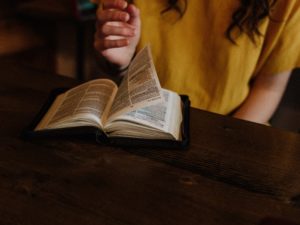Hey guys! I’m back again and this time we’ll be looking into 1 John 2:1-11.
All three of the themes I mentioned in the first post (obeying God, loving others, and doing this in Christ) will be present today, so keep an eye out as we head into the text! As always, be sure to either read the passage beforehand or read along as we go through it. Whatever I have to say, the text will probably say it better! That being said, let’s head straight into 1 John 2:1-11.
1 John 2:1-11
My dear children, I write this to you so that you will not sin. But if anybody does sin, we have an advocate with the Father—Jesus Christ, the Righteous One. 2 He is the atoning sacrifice for our sins, and not only for ours but also for the sins of the whole world.
3 We know that we have come to know him if we keep his commands. 4 Whoever says, “I know him,” but does not do what he commands is a liar, and the truth is not in that person. 5 But if anyone obeys his word, love for God is truly made complete in them. This is how we know we are in him: 6 Whoever claims to live in him must live as Jesus did.
7 Dear friends, I am not writing you a new command but an old one, which you have had since the beginning. This old command is the message you have heard. 8 Yet I am writing you a new command; its truth is seen in him and in you, because the darkness is passing and the true light is already shining.
9 Anyone who claims to be in the light but hates a brother or sister is still in the darkness. 10 Anyone who loves their brother and sister lives in the light, and there is nothing in them to make them stumble. 11 But anyone who hates a brother or sister is in the darkness and walks around in the darkness. They do not know where they are going, because the darkness has blinded them.
Hope even if we sin
The first section we can take a look at is verses 1-2. In it, John points out one of the reasons he writes the letter: “I write this to you so that you will not sin” (1 John 2:1). A whole list of other reasons show up in the next section (1 John 2:12-14), and even though we won’t be going through those today, it’s good to keep this in mind (or you could always look ahead!). He doesn’t leave the audience hanging on not sinning though—he acknowledges that we do sin (1 John 1:8) and acknowledges that we might sin again (1 John 2:1b). But we are not without hope. Why? Because:
If anybody does sin, we have an advocate with the Father—Jesus Christ, the Righteous One. He is the atoning sacrifice for our sins, and not only for ours but also for the sins of the whole world (1 John 2:1b-2).
We have an advocate, who is both righteous and the atoning sacrifice, not only for us but the whole world! One really good way to understand what that means is to look into the book of Hebrews. Although reading through the entire book would be helpful, I’ll just pull out two verses:
Such a high priest truly meets our need—one who is holy, blameless, pure, set apart from sinners, exalted above the heavens. Unlike the other high priests, he does not need to offer sacrifices day after day, first for his own sins, and then for the sins of the people. He sacrificed for their sins once for all when he offered himself (Hebrews 7:26-27).
Day after day every priest stands and performs his religious duties; again and again he offers the same sacrifices, which can never take away sins. But when this priest had offered for all time one sacrifice for sins, he sat down at the right hand of God, and since that time he waits for his enemies to be made his footstool. For by one sacrifice he has made perfect forever those who are being made holy (Hebrews 10:11-14).
By being righteous, Christ has become the perfect high priest. By being the atoning sacrifice, Christ has taken away our sins in a way that the blood of bulls and goats could never do. And he has done it for the whole world (v. 2). Another relevant image to look at is of Yom Kippur or “The Day of Atonement,” which appears in Leviticus 16. Where does Jesus fit into the picture? Is he the slaughtered goat? The goat released into the wild? Maybe the priest?
Knowing Jesus
Moving on, we get into the real meat of the passage for today. The entire section from 2:3-11 has two different ideas but is pretty much one idea and is a follow up to what we read at the end of chapter 1. There’s a claim, a but statement, and a corrected claim. And examining where we lie on those scales can show where we currently have our allegiances.
The first section we can take a look at is from verses 3-6. This has to do with knowing Jesus.
- Claim: I know Jesus (v. 4)
- But: If I do not follow his commands, I’m a liar (v. 4)
- Therefore: Whoever claims to live in him must live as Jesus did (v. 6)
Is John saying that we should be perfect and be able to follow every command without issue? No, he literally said only a couple of verses ago that people are sinners and that they will probably fall short again. But he is stressing the importance of it! We cannot claim to know Jesus and continue to wallow in sin, doing whatever we want! John goes as far to say that a person like that is a liar and that the truth is not in them. Is it extreme? Maybe. Is he correct? Yes. Because it shows where our allegiances lie. Can we really claim to trust God but live in a way that refutes that?
Loving others
Heading into verses 9-11, there’s another important command that John gives to us: love your brothers and sisters. It’s a pretty important concept. Jesus says this about loving one another: by this everyone will know that you are my disciples (John 13:35). And so we shouldn’t be too surprised when John says that we may claim to be in the light while still hating our brothers and sisters!
- Claim: I’m in the light (v. 9)
- But: if I hate my brothers and sisters, I’m still in the darkness (v. 9)
- Therefore: Anyone who loves their brothers and sisters lives in the light, and whoever hates a brother or sister lives in the darkness (v. 10)
Again, is John saying that all hope is lost because there’s that one brother or sister who’s been picking at your nerves the last couple weeks, because they’re kind of annoying and won’t shut up about God providing them a spouse? No!
What he is doing is stressing the importance of it: by this everyone will know that you are my disciples. John touches this topic even more later, saying that if we cannot love a brother or sister who is seen, how can we possibly love God, whom we haven’t seen? (1 John 4:20). What does it look like to trust God? Is it to passive aggressively make annoyed comments at that person and leave their texts unread? Or is it to love them regardless of their shortcomings? In the same way God loves us despite our shortcomings.
To end off this post for today, I challenge you to ask yourself: what does it look like to trust God? What does it look like for me to really know God? What does it look like for me to love my brothers and sisters? Because yes, even if we don’t do those things, it’s not the end of the world. It doesn’t mean we’re doomed. But what it does show is where our alleigances lie. Do I trust God fully? In every aspect and in every way? Probably not. Most of us struggle to do so. But acknowledgement is the first step, so let us walk this journey together as we try to figure that out!
Stay tuned for my next post, where we’ll address that break that appears to happen in between 1 John 2:12-14!
Read more posts in Jason’s 1 John Series.
"*" indicates required fields
Share this!
About the Author





